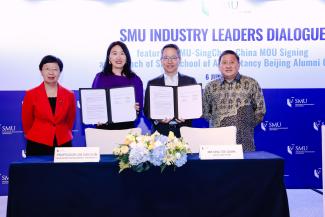
On 6 June 2024, the Singapore Management University (SMU) Industry Leaders Dialogue in China was held in Beijing at the Hong Kong Jockey Club Beijing Clubhouse. Themed ‘Financing a Greener Future: China and Southeast Asia’, the Dialogue also featured the signing of a Memorandum of Understanding (MOU) between SMU and the Singapore Chamber of Commerce and Industry (SingCham) in China, and the launch of the SMU School of Accountancy Beijing Alumni Group. His Excellency Peter Tan, Singapore’s Ambassador to the People’s Republic of China graced the occasion as Guest-of-Honour.

Close to 120 SMU International Advisory Council in China members, SMU alumni, and guests from industry and academia attended the event, that was organised in collaboration with SMU’s International Advisory Council in China, chaired by Mr Daryl Ng, Deputy Chairman, Sino Group.
.jpg?2)
Formalising a long-standing strategic alliance, SMU inked an MOU with SingCham China to leverage combined capabilities in delivering market insights into the region’s growth sectors, provide professional development opportunities, and support Singaporean businesses operating in China. The agreement also marked the expansion of SMU’s OneSingapore network beyond Southeast Asia, with SingCham China joining an established community comprising SMU and SingChams in Indonesia, Myanmar, Thailand, and Vietnam. This enhanced network bolsters SMU’s vision of serving as a gateway university connecting Asia and fosters deeper collaboration with industry to positively impact human capital development and business management across the region.
.jpg?2)
At almost 6,000 strong, SMU’s alumni population in China is one of the largest and most exuberant groups outside of Singapore. To strengthen and enrich connections amongst the SMU School of Accountancy’s vibrant community in Beijing, the University launched the SMU School of Accountancy Beijing Alumni Group. The launch ceremony was officiated by Professor Lily Kong, SMU’s President; Professor Yue Heng, Professor of Accounting, and Programme Director of SMU’s Tsinghua Joint Master of Science in CFO Leadership Program; Mr Xie Guomin, Chairperson of the SMU School of Accountancy Beijing Alumni Group; and Ms Florence Neo, Director, Office of Alumni Relations, SMU.

Moderated by Professor Lim Sun Sun, Vice President of Partnerships and Engagement at SMU, the Dialogue’s panel discussion on ‘Financing a Greener Future: China and Southeast Asia’ discussed the role of green finance in facilitating a sustainable transition, emphasising the importance of mobilising private capital for sustainable energy solutions. They also discussed the potential of green finance to transform traditional economies such as the automotive and energy industries, while acknowledging the challenges of investing in disruptive technologies and the need for standardisation to combat greenwashing.
Associate Professor Hao Liang, Associate Professor of Finance, and Co-Director, Singapore Green Finance Centre at SMU, set the stage for the discussion by highlighting that in addition to financing green businesses, it is important to embrace transition finance to help ‘brown’ businesses decarbonise He conveyed that the market need for transition finance globally stands at an estimated USD$100 trillion. Across the global green finance landscape, countries such as the United States of America have taken a market-oriented approach to building a sustainable economy, while countries like China, Singapore and the European Union have been more top-down, involving early government intervention.
Mr Eason Liu (MSc in Applied Finance, Class of 2010), Founding Partner, NBT Capital, and Member, SMU’s International Advisory Council in China, and President of SMU Alumni Chapter, Beijing, commented that Singapore is in a good position to advance green investing and standards, owing to its geography and position as one of the financial hubs in the region. In his view, the stage of economic development and presence of government subsidies in different countries, play key roles in the type of green finance instruments present, and acceleration of green capital growth.
Mr Ian Zhu, Managing Partner, Nio Capital, opined that government policies and subsidies play a role in incentivising and mobilising private capital investment into green businesses. In China, a good example is the electric vehicle industry. Creating market standards that support sustainable consumerism translate to profit-making for green businesses and this attracts private capital. On greenwashing, Mr Zhu echoed Associate Professor Hao’s thoughts on bolstering the development and scaling of new technology. He opined that solar adoption in China stands at about 7% of the energy mix, although there is potential for it to grow to 50% without cost to the economy.
Professor Wang Yao, Director General of the International Institute of Green Finance at the Central University of Finance and Economics shared her aspirations for green finance to no longer be a topic of its own, but rather for finance to be green by nature in 10 to 20 years. Green consumer products and services currently make up about 13% of China’s economy, and she was bullish about its continued rise in the years to come.
Professor Lim closed the panel on a high note by highlighting that with advancements in green and transition finance instruments and frameworks, she is hopeful of the bluer skies and more sustainable future that we may all build together.
.jpg?2)
This is the fourth SMU Industry Leaders Dialogue in China since the inaugural session in 2018, which was held in conjunction with the launch of the SMU International Advisory Council in China. Previous editions took place in Hong Kong, Shanghai, and Shenzhen.
The SMU International Advisory Council is a regional initiative established by SMU to consult regional industry leaders on how the university may grow its footprint across China and Southeast Asia. To date, seven councils have been established in China, Indonesia, Malaysia, Myanmar, the Philippines, Thailand, and Vietnam. View the full list of council members by country here.
.jpg?2)